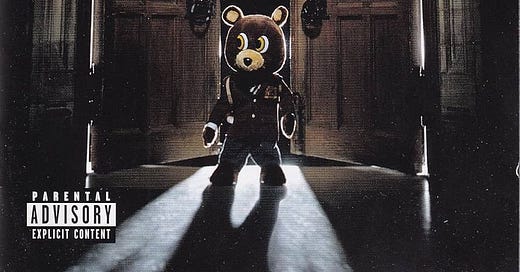‘Gone’, the concluding track (proper1) of Kanye West's second album Late Registration, released in the Summer of 2005, exemplifies his evolving artistry and that knack he had in the middle of that decade for blending soulful samples with contemporary hip-hop. This track is the album's musical finale and an essential stopping stage on his career trajectory, marking a significant point in his evolution from producer to global superstar. By 2005, Kanye West was no longer just a music producer; he had firmly established himself as a leading figure in the hip-hop community as an act himself. His debut album, 2004’s The College Dropout, had already disrupted mainstream hip-hop by offering something different to 50 Cent and The Game and their more atypical gangsta rap narrative. West was riding a more accessible, soul-infused style that arguably did much to open the genre's circle of appeal. With Late Registration, Kanye expanded his musical palette, incorporating orchestral arrangements and bringing a broader array of samples, thanks in part to his collaboration with film score composer Jon Brion, who had spent much of the previous decade working on scores for Paul Thomas Anderson films and artists like Fiona Apple, Macy Gray and Rufus Wainwright.
‘Gone’ was solely produced by West, but Brion’s influence is still present with the string arrangement, adding a cinematic feel that gives the song both a forward look and a retrospective air. Another critical component is the Otis Redding sample of his 1965 cover of Chuck Willis’ ‘It’s Too Late’.
Sitting underneath that sample are those lush strings and a resonant piano melody. But significant sections of the song end up being purely instrumental chamber-pop - adding even more to the sense that this could be a piece of music as at home a soundtrack like Eternal Sunshine of The Spotless Mind, that Brion worked on in 2004.
The rich orchestral arrangement includes an 18-piece string section conducted by Eric Gorfain. Recorded at Capitol Recording Studios in Hollywood, California, the strings add a dramatic flair to the track, highlighting West's innovative approach to hip-hop production. Brion's influence is evident in the detailed counterpoint and the staccato bursts of the string section, which move with the rise and fall of West's voice.
Lyrically, ‘Gone’ explores themes of fame, ambition, and disillusionment, familiar territory for artists on their second and third albums. West contemplates abandoning his celebrity status and seeking a simpler life, reflecting on his frustration with the music industry's constraints and his desire for creative freedom and power beyond the boxes he feels he is in. The repeated refrain of "I'm ahead of my time, sometimes years out" at the end shows Kanye's sense of being misunderstood and his drive to push creative boundaries.
West, Cam'ron, and Consequence deliver the song's verses, each with unique perspectives. Cam'ron's verse is characterised by his trademark bravado, while Consequence's delves into personal storytelling, touching on themes of loss and resilience. Kanye and Cam'ron had previously collaborated on Cam'ron's single ‘Down and Out’ from his 2004 album Purple Haze2. Consequence's relationship with Kanye West dates back to the early 2000s when he contributed to several tracks on Kanye's debut album, The College Dropout. By the time Late Registration was in production, Consequence had become integral to Kanye's creative circle.
Kanye's final verse, preceded by that instrumental chamber-pop passage of nearly a minute, is particularly impactful. The orchestral arrangement swells and contracts with the rise and fall of Kanye's voice, creating a dynamic interplay that enhances the emotional weight of his lyrics.
As the final track on Late Registration, ‘Gone’ encapsulates the artistic ambitions and personal struggles that characterise much of the album. It was an album that saw West expand on the soulful foundations of The College Dropout with lush orchestral arrangements and delve deeper into personal and societal issues, including fame, materialism, and more of a focus on social justice. The album's lush orchestral production set a new standard for hip-hop, blending classical music elements with traditional hip-hop beats. Ultimately, it was a step on West’s journey into electronic and synthesiser-driven output on Graduation and 808s & Heartbreak. Still, he would bring all those elements together on 2010’s My Beautiful Dark Twisted Fantasy.
Years later, Drake, Travis Scott, and especially Kendrick Lamar used this type of orchestration and classical music plundering on songs like ‘Sing About Me, I'm Dying of Thirst’ and ‘Mortal Man’. These torchbearers have continued exploring and expanding the sonic landscapes that West was luxuriating in twenty years ago.
Are you still a fan?
The Run Out Grooves: So, Kendrick Lamar, on ‘Mortal Man’, the final track on your 2015 album To Pimp A Butterfly, there are a few names you mention that you use to tie the album’s theme together. Firstly you speak of Nelson Mandela, and you’ve visited his cell on Robben Island for inspiration and maybe even to find some clarity. Mandela is someone who sp…
Usually, I would discuss the hidden track ‘Late,’ but the bonus version of ‘Diamonds from Sierra Leone’ in between means I’ve decided not to do that this time.
Although Kanye received production credit for the track, it was later revealed that Brian “All Day” Miller created the beat.






Maybe my favorite Kanye song. Orchestration is stunning